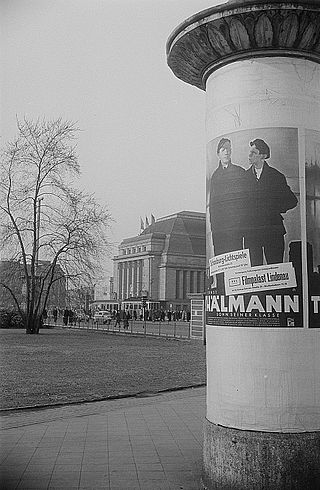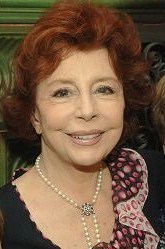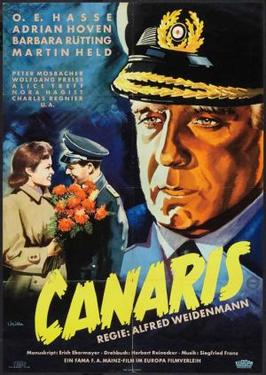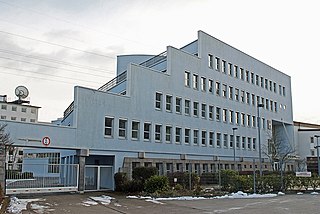Heimatfilme were films of a genre popular in Germany, Switzerland, and Austria from the late 1940s to the early 1960s. Heimat can be translated as "home", "hometown" or "homeland".
Oskar Sima was an Austrian actor who is best remembered for appearing in supporting roles in countless comedy films from the 1930s to the 1960s.

Ernst Thälmann is an East German film in two parts about the life of Ernst Thälmann, leader of the Communist Party of Germany during much of the Weimar Republic, directed by Kurt Maetzig and starring Günther Simon in the title role. The first part, Ernst Thälmann - Sohn seiner Klasse, was released in 1954. It was followed by the 1955 sequel. Ernst Thälmann - Führer seiner Klasse.

Peter van Eyck was a German-American film and television actor. Born in Prussian Pomerania, he moved to the United States in the 1930s and established a career as a character actor. After World War II, he returned to his native country and became a star of West German cinema.
Kurt Ulrich was a German film producer. He produced more than 140 films between 1933 and 1964. He was born in Berlin, Germany.

Paul Hörbiger was an Austrian theatre and film actor.

Sonja Alice Selma Toni Ziemann was a German film and television actress. In the 1950s, she was among Germany's most prominent actresses, awarded the 1950 Bambi for appearing, together with Rudolf Prack, in Schwarzwaldmädel. From the 1960s, she turned to more serious acting in international films such as The Secret Ways. She played in several anti-war films such as Strafbataillon 999. She also appeared on stage and in television.
Beppo Brem was a German film actor, who was in over 200 film and television productions between 1932 and 1990. He often played stereotypically Bavarian characters, but managed to find respect as a character actor in later years.
Bobby E. Lüthge was a German screenwriter.
Ernst Waldow was a German film actor. He appeared in more than 160 films during his career.
Kurt Schulz (1913–1957) was a German cinematographer.
Arthur Maria Rabenalt was an Austrian film director, writer, and author. He directed more than 90 films between 1934 and 1978. His 1958 film That Won't Keep a Sailor Down was entered into the 1st Moscow International Film Festival. Two years later, his 1960 film Big Request Concert was entered into the 2nd Moscow International Film Festival. His career encompassed both Nazi cinema and West German productions. He also wrote several books on the 1930s and 1940s wave of German cinema.

Canaris is a 1954 West German drama film directed by Alfred Weidenmann and starring O. E. Hasse, Barbara Rütting and Adrian Hoven. It portrays real events during the Second World War when Wilhelm Canaris, the head of German military intelligence, was arrested and executed for his involvement with the 20 July Plot to overthrow Adolf Hitler. The film was a major success at the German box office, possibly because it allowed audiences to identify with a heroic German figure disassociated from Nazism. Released in the UK as Canaris Master Spy, and in the US as Deadly Decision—it is also known by the alternative title Canaris: Master Spy.
Real Film or Real-Film was a West German film production company. It was established in 1947 in Hamburg, then part of the British Zone of Occupation. Its founders were Walter Koppel and the Hungarian Gyula Trebitsch. The company released some rubble films but gradually switched to concentrate on comedies and musicals. In 1948 an estate in Wandsbek was acquired and developed into a modern film studio, with space sometimes rented out to other companies. The company became a stable and economically successful producer in the 1950s.

The Wandsbek Studios are film production and television studios located in Wandsbek, a district of the German city of Hamburg.
Capitol Film was a West German film production company active between 1953 and 1956 established by Arno Hauke. The company was able to utilise the assets of the former UFA company, now being held in a trust of which Hauke was an accountant and director. With the trust's funds Hauke had also acquired a distribution company Prisma Film to release Capitol's films.
Deutsche London Film or Deutsche London-Film was a West German film distribution company active from 1940 to 1956. Handling both domestic productions and imports, and concentrating on popular film genres, it established itself as one of the bigger distributors. This took place during the economic recovery of the German film industry in the post-Second World War period, as audiences reached peak numbers by the mid-1950s.





